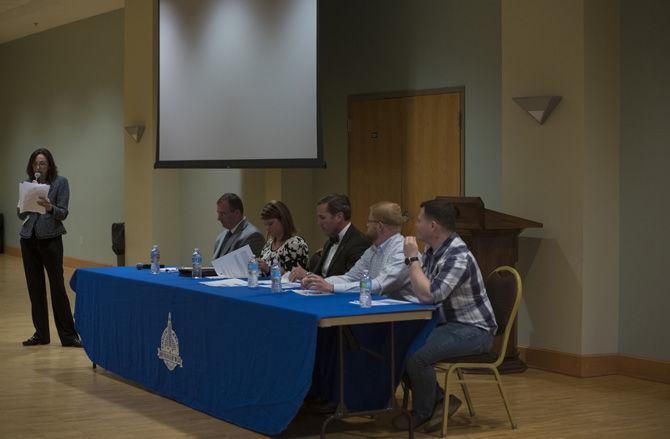Groups like Baton Rouge’s Capital Area Human Services are spreading awareness of the opioid epidemic in the United States and Louisiana.
CAHS hosted a “Fighting the Opioid Epidemic” event and panel Thursday night at the BREC Administrative Center to discuss opioid addiction, prevention and treatment.
Opioids are drugs used to reduce pain, including prescription painkillers, heroin, OxyContin, Percocet, Vicodin, morphine and codeine.
The event began with the viewing of a documentary titled “Chasing the Dragon: The Life of an Opiate Addict.” The film featured opioid abusers who shared their personal stories of addiction and the consequences experienced with their lifestyle choices.
After the documentary, a group of five panelists presented their suggestions and advice on opioid abuse, prevention and treatment questions asked by the audience.
Panelists included Brad Byerley, Baton Rouge Drug Enforcement Administration assistant special agent in charge; Chemistry Manager of the Louisiana State Police Crime Lab Rebecca Nugent; William “Beau” Clark, East Baton Rouge Parish coroner; David Laxton, director of Baton Rouge Comprehensive Treatment Center; and a person in recovery named Anthony Pierre, Jr.
According to CAHS, Louisiana is one of eight states that has more opioid prescriptions than it has residents, and the number of opioid deaths increased by 12.4 percent between 2014 and 2015.
CAHS stated that 91 people die from an opioid-related overdose on an average day in the United States.
“It’s way worse than an epidemic,” Byerly said. “This is everywhere, it does not discriminate.”
The panelists discussed a tier-model for addressing the addiction: DEA enforcement, adhering to regulations and promoting outreach to the public to educate and inform.
Clark said many opioid abusers initiate their addiction after being prescribed medication from a physician to relieve pain from an injury. He said once the prescription runs out, those consumers begin to look for and obtain the drugs in other ways.
He said the medical community is also responsible for properly administering medications. Pain is not always a bad thing that should be stopped because it is the body’s natural physiological response and attempt to get well, Clark said.
He said limiting prescriptions to seven days and prescribing non-narcotics after is “a step in the right direction.”
A January 2017 standing order in Louisiana made naloxone, an opioid-overdose reversal drug, available for purchase from pharmacies without a prescription. Additionally, Louisiana’s Good Samaritan Law offers legal immunity to people who assist anyone injured or in danger.
Laxton said medication-assisted treatment is an ideal option for opioid users, as it combines the use of medications with behavioral therapy to prevent overdoses and substance abuse disorders.
He said it is important to distinguish the difference between a drug and a medication, which is the supervision of a healthcare provider.
Pierre, who said he has been sober for one year, spoke about his 11-year struggle with addiction – that span does not include his addiction to alcohol and marijuana in high school, he said.
He said stealing his father’s medications for his own use resulted in his father’s cardiac arrest and death.
Pierre said he’s known he needed help with his addiction since high school, but always felt he could not afford treatment. Many other addicts feel the same way, he said.
“There is a way to go to affordable treatment,” he said. “The programs are there.”
Pierre said in addition to educating the future about opioids and addiction and how to prevent and address the issue, people should “stop talking about it behind closed doors.” He also said anyone prescribed opioids for medical use should dispose of them when the body no longer needs them and to not “save them for a rainy day.”
“As human beings,” Pierre said, “we have to stand up and say, ‘I will not give up on my people.’”
Capital Area Human Services hosts event to address opioid epidemic and prevention
April 7, 2017
Several panelists prepare for questions during the town hall meeting on April 6, 2017, in the BREC Administrative Center.





